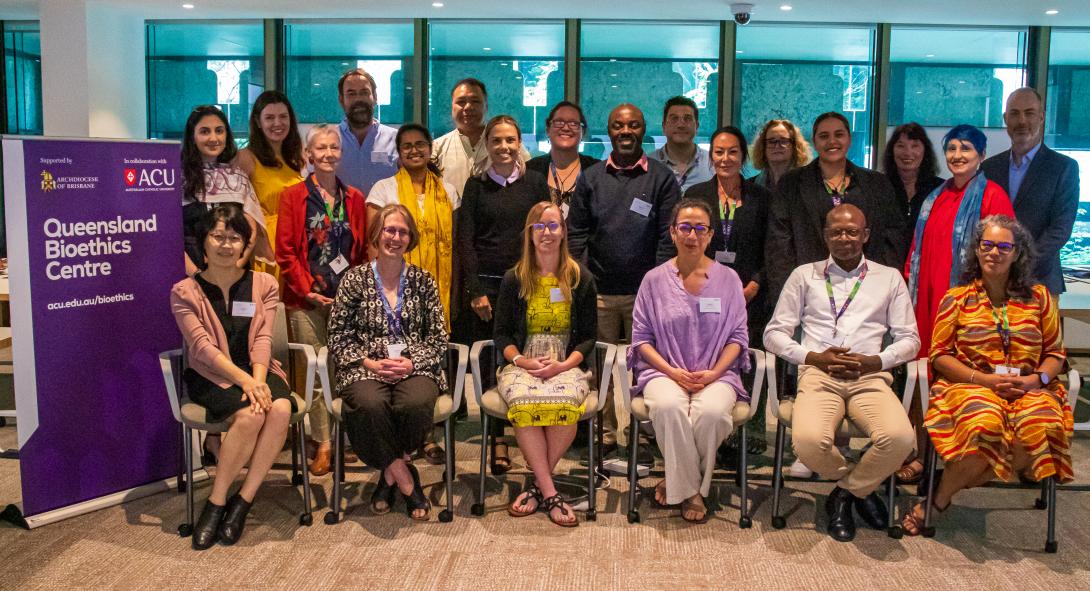
The third regional workshop of the Global Health Solidarity Project was successfully held in Brisbane, Australia, on 28-29 November 2024. The workshop brought together 25 participants to explore and enable theories and practices of solidarity and adjacent concepts in Australia, Aotearoa New Zealand, and the wider Pacific. As part of efforts to shift understandings and practice of solidarity in global health, this workshop employed a blend of group discussions, presentations and vignettes to unearth intercultural understandings of solidarity and its applications in global health.
The workshop began with a Welcome to Country ceremony performed by Songwoman Maroochy, an Elder of the Turrbal People, a direct descendant of Daki Yakka – Chief of the Old Brisbane Tribe. As the sole group of Traditional Owners and Custodians of Brisbane, she welcomed participants to the land. Caesar Atuire (PI of the GH Solidarity project) and David Kirchhoffer (Director of the Queensland Bioethics Centre, Australian Catholic University) followed with introduction to the GH Solidarity project and ACU Bioethics Centre.
"The workshop provided an opportunity to affirm the importance of solidarity with sex workers with respect to global health concerns. Stigma and discrimination run deep, impacting these communities, and it has been brilliant to be able to explore concepts pertaining to solidarity in a wider sphere. It was significant to sit with people from such varied backgrounds and realise there are shared visions to advance and fill the space for solidarity." Catherine Healy (Aotearoa New Zealand Sex Workers' Collectors) expressed at the end of the workshop.
" We valued the opportunity to share our work in advancing migrant and refugee women’s health and to highlight the importance of applying an intersectional feminist lens to practicing solidarity. This is an important project because prioritising solidarity in global health is a vital first step toward achieving health equity for all." Delaram Ansari (Multicultural Centre for Women’s Health (MCWH), Australia), said after the workshop.
The ‘immersing in solidarity’ session, facilitated by ACU First People Directorate Team, utilized a yarning circle, Indigenous practices of sharing stories in a safe space. This allowed participants to exchange personal experiences and reflections on solidarity, sparking discussions on key elements, factors, and tensions within solidarity concepts and practices. Day one also featured insightful presentations by three Indigenous scholars from Australia, New Zealand, and Fiji, emphasising themes such as relational being, non-linear understanding of time and space, and the role of narratives and imagination.
On day two, participants explored applied ethics, including Catholic ethics, bioethics, and environmental ethics, examining the meanings of solidarity in religious ethics, data-driven health research for low-trust communities, and socio-environmental relations. The ‘actionable solidarity’ session showcased the incredible work of scholars and activists advocating for refugees and migrants, sex workers, people with disabilities, and Indigenous populations. It highlighted shared principles such as recognition, trust, participation, collaboration, and accountability in advancing health and wellbeing.
Overall, the workshop underscored the potential benefits and harms of solidarity in identifying and addressing the challenges of the polycrisis. Bridget Pratt (Co-PI of the GH project, ACU) delivered the closing remark, encouraging participants to engage in follow-up work of this project.
Read blog on sex workers solidarity here.
- Log in to post comments